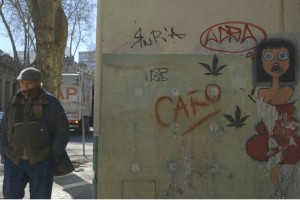Uruguay may be seen as a sort of Utopia among many civil rights activists, but it is still a land divided. And nowhere is Montevideo’s pulse better felt than on La Rambla, the winding avenue that hugs the Rio de la Plata’s meandering coastline and separates the city’s skyscrapers from its stunning beaches and bike paths.
The scenic stretch of road is popular with camera-toting tourists, but La Rambla is the lifeline for locals who favor its beaches and paths for running, sunning and sipping their tea-like mate drinks. While walking along the mammoth river’s beach, the scent of burning weed is almost as prevalent as the sight of steaming mate gourds.

“If it’s a nice day, you find a lot of people smoking marijuana,” said Cánepa, whose office is next door to the president’s digs in the Executive Tower. “You can smell marijuana in every place of this city.”
From gritty inner-city plazas to the string of pearls that is La Rambla, the smell is there, darting in and out of olfactories and turning heads. The cannabis conversation is also prevalent — especially among youths.
“Uruguay is an aged country,” said Florencia Lemos, a 23-year-old pro-cannabis activist with the Uruguayan human rights organization ProDerechos. “Many times, because we are few and the adult population couldn’t decide their own youth because they were in a dictatorship, the youth demands dissent with that generation. But I think that a change has started in this sense where the youth are heard more and more and we can organize ourselves and fight for our rights.”
Sitting in Montevideo’s charmingly illuminated Plaza Entrevero on a frigid evening in August, Lemos talked with two of her ProDerechos colleagues about their work, which has mirrored much of President Mujica’s recent agenda.
“I personally had never imagined such a huge step forward from Mujica,” said Damian Collazo, 24, also a ProDerechos volunteer and the head grower of the CLUC (Cultivando Libertad Uruguay Crece) cannabis club, a name that translates to Cultivating Freedom Uruguay Grows. “It’s hugely daring. And I don’t know if a different president would have taken this step.”

Their friend and fellow activist Martin Collazo, 26, agreed that Mujica was central to marijuana reform but added that “it wouldn’t have been possible also without a vast coalition of social activists, politicians and university graduates, the coalition of people who were fighting for a reform like this for eight years.”
Across Montevideo in an urban slum, activist Alvaro Calistro is a self-made pharmacist and social worker who dispenses cannabis out of his house/community center/garden to low-income residents who use the pot to kick more significant drug habits.
“Pepe Mujica, our president, is a friend, a regular citizen,” Calistro said, using the president’s popular nickname. “He is a humble person in his life. We respect him for the bravery it took to put this subject on the table. We believe that no other politician could have had the courage to make this law happen.”
In a different, more affluent Montevideo neighborhood, 23-year-old Andres Harreguy talked on his condo’s private patio about the reality for a young recreational smoker such as himself.
“Most of the people around me, they like the weed,” said Harreguy, playing with a baby cannabis plant he’s growing from seed. “Even if they don’t like to smoke, they have no problem. My mother told me when I was 12 years old: ‘Weed is better than a cigarette.’ I have to tell you this because it was true then and it is true now.”
Members of Mujica’s administration say their five years in power have brought movement for the country.
“In the last five, six, seven, eight years,” Drug Council secretary general Calzada said, “there has been progress that had not been achieved in the previous 50 years.”
But not everyone agrees. Fredy da Silva is a psychopathology professor at the Universidad Católica del Uruguay and the director of two Montevideo rehabilitation and treatment clinics. He believes in limited medical powers of cannabis, for tremendous pain and nausea, but he still views it as a gateway drug to more serious substances and an agent that will advance psychotic mental disorders.
“What’s going to happen is a lot of young people will smoke marijuana, and a few of them will become psychotic patients,” da Silva said. “In other words: We are going to have much more work to do.”
Alicia Castilla is an Argentinian cannabis activist who lives on a rural beach 45 minutes outside of central Montevideo. She spent 95 days in jail in 2011 after police found 29 marijuana plants in her yard, and she has since taken to speaking out against Mujica and his plans for pot regulation.
“No one puts limits on the alcohol that you can buy, right?” Castilla asked. “No, no, quite the opposite. I see that the (cannabis) user has been stigmatized and that privacy has been invaded and the concept of regulation has been enforced — when I believe that we have to decriminalize, not criminalize.”
When asked about President Mujica — “the world’s most radical president,” according to a recent, glowing Guardian piece — Castilla responded sharply: “Mujica is a freak that needs to be studied, because he sells an image to the foreigners.”
Partido Nacional presidential candidate Lacalle Pou also has strong words for Mujica. That said, Lacalle Pou is no stranger to marijuana.
“When I was young,” Lacalle Pou said, “I smoked joints, and I didn’t tell my parents.”
Lacalle Pou is against Mujica’s marijuana policy, preferring a system many would say is more liberal: no legal sales whatsoever, zero regulations or plant minimums on home grows, no minimum toking age. From Lacalle Pou’s perspective, self-cultivation is the answer. He agrees with Mujica’s staff that there’s no turning back on the grand issue of marijuana in Uruguay.
“We have to make it clear that drugs and money, they’re not a good company,” said Lacalle Pou. “We should be prepared to establish a mature relationship with this substance, because it’s coming. Actually, it’s already here.”
